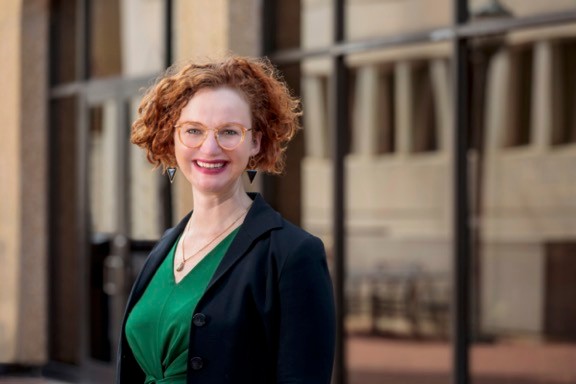Alright – so today we’ve got the honor of introducing you to Rebecca Janzen. We think you’ll enjoy our conversation, we’ve shared it below.
Rebecca, so good to have you with us today. We’ve got so much planned, so let’s jump right into it. We live in such a diverse world, and in many ways the world is getting better and more understanding but it’s far from perfect. There are so many times where folks find themselves in rooms or situations where they are the only ones that look like them – that might mean being the only woman of color in the room or the only person who grew up in a certain environment etc. Can you talk to us about how you’ve managed to thrive even in situations where you were the only one in the room?
I work at a university, part of a larger system of higher education. While overall, universities teach more women than men (the statistics only reflect the gender binary, not the lived reality of students), the majority of people who work in universities are women and the majority of people at higher levels of administration remain men. At my institution, and at many others, these people are also overwhelmingly white. I entered administration in the 2021-2022 academic year as a Director of Graduate Studies and I was regularly in rooms of other white folks, who were primarily men. I prepared for this reality while at the same time refused to cater to it. So too did following up on everything in writing.
Thanks for sharing that. So, before we get any further into our conversation, can you tell our readers a bit about yourself and what you’re working on?
I’m a professor at the University of South Carolina, where I research and teach about Latin American culture. My research and teaching focus on Mexico, looking at religion, politics, gender, and disability in art, film, historical documents, and literature. I have written four books – the most recent one, Unlawful Violence, about criminal justice reform, and human rights laws, was published with Vanderbilt University Press in 2022
This year (2023-2024 academic year), I am on sabbatical. I am researching religious sites in and near mining operations in the Americas. While conducting other research on Mormons, it came to my attention that there were temples, that is, places where important religious rituals take place, located next to a large open pit mine. There are churches, shrines, and other sacred sites near other mines. I am looking at how these sites might give workers a sense of labor protection, how they might be akin to corporate social responsibility, and how they might also give a sense of environmental protection.
I have visited archives in Lisbon, Madrid and Seville to begin this project and I am looking forward to further research.
Other books:
The National Body in Mexican Literature, about disability in Mexico, https://sunypress.edu/Books/L/Liminal-Sovereignty2, about Mennonites and Mormons and the Mexican State, and https://sunypress.edu/Books/U/Unholy-Trinity2, about religious imagery in Mexican film.
Looking back, what do you think were the three qualities, skills, or areas of knowledge that were most impactful in your journey? What advice do you have for folks who are early in their journey in terms of how they can best develop or improve on these?
A skill that draws many people’s attention is my writing. I am often asked how I write so much. I would highlight that people do not ask prolific men how they do this, so I will not discuss the qualities and skills that have helped me write two dozen single authored articles or book chapters (this includes ones in progress, it does not include ones I have abandoned) and four single authored books. I will instead tell people that they should figure out how they write, and work with the life they have rather than trying to emulate someone else.
How would you spend the next decade if you somehow knew that it was your last?
I am beginning a new project – unlike previous projects, which focused primarily on Mexico, and connections to specific religious communities in the USA and in Canada, this project looks at sites across the Americas. One part deals with the Church of Jesus Christ of Latter-day Saints in Latin America, which expands on what I have written about that church already, and the portions that deal with Catholicism expand on the two books I have written that deal with the Catholic Church in some capacity. As I look to the future, I am confident that I have the background knowledge and skills to be successful.
Contact Info:
- Website: https://sc.edu/study/colleges_schools/artsandsciences/dllc/our_people/janzen_rebecca.php
- Other: https://sc.edu/uofsc/posts/2022/04/breakthrough_star_rebecca_janzen.php https://scholar.google.com/citations?user=mRnvLeoAAAAJ&hl=en






Image Credits
USC PR Office, David Mesa Muñoz, Fernando Romero Real




